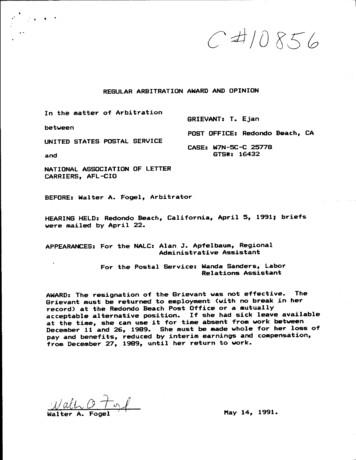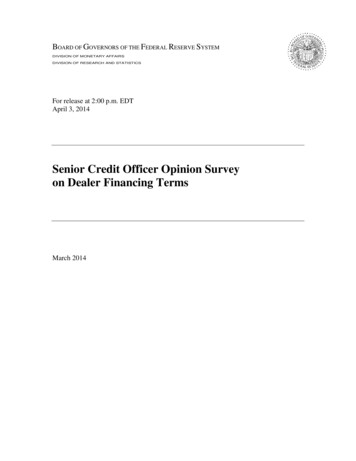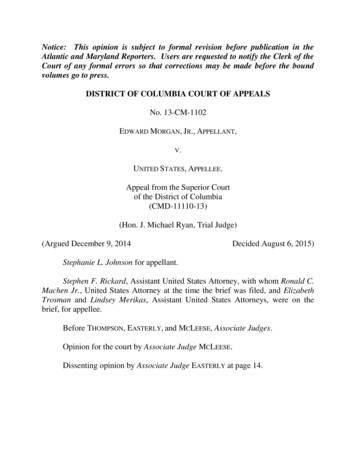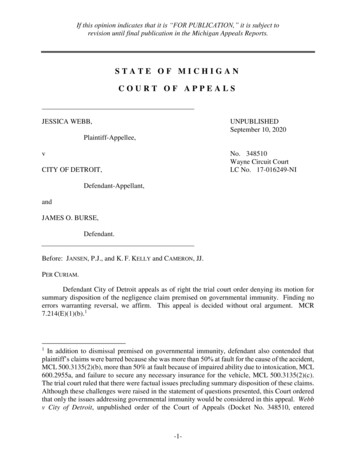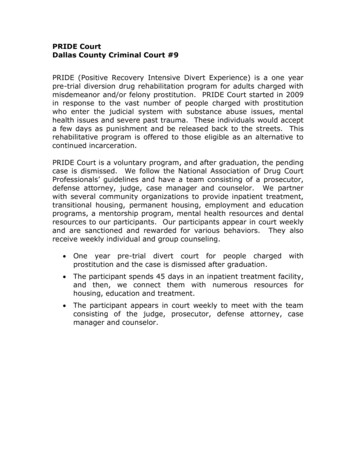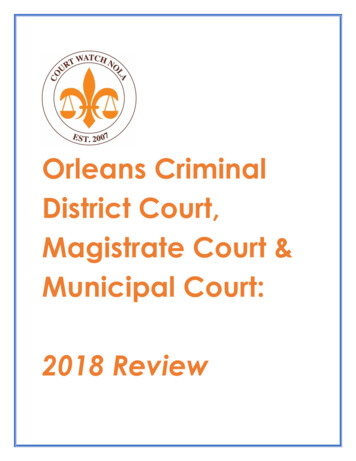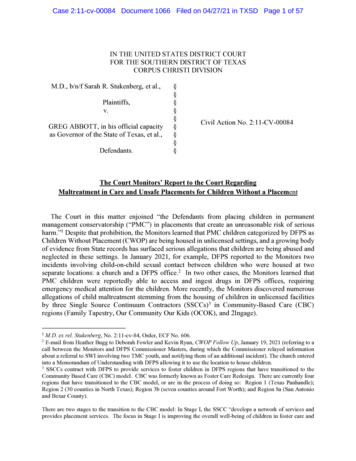
Transcription
Vaughn v. Judy et alDoc. 8IN THE UNITED STATES DISTRICT COURT FOR THEMIDDLE DISTRICT OF TENNESSEENASHVILLE DIVISIONCHARLES C. VAUGHN #107390,Plaintiff,v.KIM JUDY, et al.,Defendants.)))))))))NO. 3:21-cv-00370JUDGE RICHARDSONMEMORANDUM OPINIONPlaintiff Charles Vaughn, an inmate at the Dickson County Jail in Charlotte, Tennessee,filed a pro se civil rights complaint under 42 U.S.C § 1983 (Doc. No. 1), an application to proceedas a pauper (Doc. No. 5), a motion for jury trial (Doc. No. 4), and an incomplete form consentingto have a Magistrate Judge conduct all proceedings in this case (Doc. No. 7). This action is beforethe Court for an initial review of the Complaint and a ruling on the pending motions.I.Application to Proceed as a PauperThe Court may authorize a prisoner to file a civil suit without prepaying the filing fee. 28U.S.C. § 1915(a). Plaintiff’s application to proceed as a pauper (Doc. No. 5) is accompanied by acertified copy of his inmate trust account statement (id. at 3–6) reflecting that he is unable to paythe full filing fee in advance. Accordingly, the application (Doc. No. 5) will be granted and the 350.00 filing fee will be assessed as directed in the accompanying Order. 28 U.S.C. § 1915(b)(1).II.Initial ReviewThe Court must dismiss the Complaint if it is frivolous or malicious, fails to state a claim,or seeks monetary relief against a defendant who is immune from such relief. 28 U.S.C.§§ 1915(e)(2)(B), 1915A(b); 42 U.S.C. § 1997e(c). The Court also must liberally construe pro seDockets.Justia.com
pleadings and hold them to “less stringent standards than formal pleadings drafted by lawyers.”Erickson v. Pardus, 551 U.S. 89, 94 (2007) (citing Estelle v. Gamble, 429 U.S. 97, 106 (1976)).A.Factual AllegationsLiberally construing the Complaint (Doc. No. 1) and a supplemental notice (Doc. No. 6),the Court has established the following summary of factual allegations for the purpose ofconducting an initial review.Plaintiff, a stage 4 cancer patient with a ureteral stent, was incarcerated at the DicksonCounty Jail on October 29, 2020. (Doc. No. 6 at 1–2.) During intake, Plaintiff provided informationon his ailments, doctors, and ongoing medical treatment. (Id. at 1.) Kim Judy, a charge nurseemployed by Southern Health Partners at the Jail, reviews medical intake forms. (Id. at 1–2.) Judy“set up and honor[ed] [Plaintiff’s] cancer treatments of immunotherapy,” but she cancelled asurgery to change Plaintiff’s stent scheduled for November 23, 2020. (Id.) Judy stated that she didso because “an inmate isn’t supposed to know his surgery dates.” (Id.) Judy told Plaintiff that shewould reschedule the surgery, but she has not done so. (Id.)After November 23, 2020, Plaintiff’s stent “was becoming painful from not having” thesurgery. (Id. at 2.) He describes the pain as “intense.” (Doc. No. 1 at 5.) On December 1, Plaintiffsubmitted a “pain management request.” (Doc. No. 6 at 1–2.) Judy continued to deny Plaintifftreatment and prevented him from ordering over-the-counter pain relief pills. (Doc. No. 1 at 5;Doc. No. 6 at 2.) Plaintiff then showed Judy copies of his medical records, lab results, and CTscans to demonstrate that the previously scheduled surgery was medically necessary. (Doc. No. 6at 2.) Judy claimed to be “taking care of it,” but she did not reschedule the surgery. (Id.)2
On February 8, 2021, Judge David Wolfe1 signed an “Emergency Transport Order” forPlaintiff to be housed in a hospital facility, but he remained at the Jail. (Id.) Since that time, Plaintiffhas developed Hydronephrosis—a condition described by Plaintiff as the kidney “drown[ing].”(Doc. No. 1 at 5). Plaintiff also alleges that his stent became encrusted to the ureter and hedeveloped a kidney infection. (Id.; Doc. No. 6 at 2.) Plaintiff alleges that the denial of medicaltreatment caused him “diminished life expectancy.” (Doc. No. 6 at 3.)Plaintiff’s family called the Jail to complain, and Plaintiff filed grievances on April 6 and20, 2021. (Id. at 2–3.) The Sheriff and Captain told Plaintiff that they thought the surgery was set,and Judy claimed it was not her responsibility. (Id. at 3.)Plaintiff sues Kim Judy, Southern Health Partners, and Dickson County. (Doc. No. 1 at 2–3.) He requests monetary damages (id. at 5) and “waiver of service.” (Doc. No. 6 at 3.)B.Standard of ReviewTo determine whether a Complaint “fails to state a claim on which relief may be granted”under the applicable standards, the Court applies the same standard as under Rule 12(b)(6) of theFederal Rules of Civil Procedure. Hill v. Lappin, 630 F.3d 468, 470–71 (6th Cir. 2010). The Courttherefore accepts “all well-pleaded allegations in the complaint as true, [and] ‘consider[s] thefactual allegations in [the] complaint to determine if they plausibly suggest an entitlement torelief.’” Williams v. Curtin, 631 F.3d 380, 383 (6th Cir. 2011) (quoting Ashcroft v. Iqbal, 556 U.S.662, 681 (2009)). An assumption of truth does not extend to allegations that consist of legal1The Court takes judicial notice that Judge Wolfe is a Circuit Court Judge in Dickson County. SeeTENNESSEE ADMINISTRATIVE OFFICE OF THE COURTS, ancery-courts/judges/david-dee-wolfe (last visited May 28, 2021); Fed. R. Evid. 201(b) (“The court mayjudicially notice a fact that is not subject to reasonable dispute because it . . . can be accurately and readilydetermined from sources whose accuracy cannot reasonably be questioned.”).3
conclusions or “‘naked assertion[s]’ devoid of ‘further factual enhancement.’” Iqbal, 556 U.S. at678 (quoting Bell Atl. Corp. v. Twombly, 550 U.S. 544, 557 (2007)).C.Discussion“There are two elements to a [Section] 1983 claim. First, a plaintiff must allege that adefendant acted under color of state law. Second, a plaintiff must allege that the defendant’sconduct deprived the plaintiff of rights secured under federal law.” Handy-Clay v. City ofMemphis, Tenn., 695 F.3d 531, 539 (6th Cir. 2012) (citing Fritz v. Charter Twp. of Comstock, 592F.3d 718, 722 (6th Cir. 2010)).1.Capacity of DefendantsBefore addressing the substance of Plaintiff’s claims, the Court must address a proceduralissue. Plaintiff checked a box on the Complaint reflecting that he sues all three Defendants in theirofficial capacities, and he left the box for “individual capacity” unchecked. (Doc. No. 1 at 2–3.)For Southern Health Partners and Dickson County, this distinction is of little importance, as anindividual-capacity framework is inappropriate for claims against private entities andmunicipalities. See Wildbur v. Trousdale Cnty. Comm’r, No. 3:21-cv-00212, 2021 WL 1405480,at *2 (M.D. Tenn. Apr. 14, 2021). Thus, Plaintiff’s claims against these two Defendants will beaddressed alongside Plaintiff’s official-capacity claims below. But for Kim Judy, this distinctionmatters, because an individual-capacity claim “may attach personal liability to [Judy], whereas [anofficial-capacity claim] may attach liability only to the” entity Judy represents. See Essex v. Cnty.of Livingston, 518 F. App’x 351, 354 (6th Cir. 2013) (citing Kentucky v. Graham, 473 U.S. 159,165–67 (1985)).“However, a plaintiff’s failure to explicitly state ‘individual capacity’ in the complaint isnot necessarily fatal to” individual-capacity claims. Rodgers v. Banks, 344 F.3d 587, 594 (6th Cir.4
2003). The Court “employ[s] a ‘course of proceedings’ test to ascertain whether a § 1983 defendantwas on notice that the plaintiff intended to hold him or her personally liable, notwithstanding theplaintiff’s failure to provide explicit notice.” Id. (citing Shepherd v. Wellman, 313 F.3d 963, 967(6th Cir. 2002)). In doing so, the Court analyzes “factors [such] as the nature of the plaintiff’sclaims, requests for compensatory or punitive damages, and the nature of any defenses raised inresponse to the complaint.” Goodwin v. Summit Cnty., 703 F. App’x 379, 382 (6th Cir. 2017)(quoting Moore v. City of Harriman, 272 F.3d 769, 772 n.1 (6th Cir. 2001)).Here, the nature of Plaintiff’s claim against Kim Judy is that she personally denied himmedical treatment. (Doc. No. 1 at 4 (“Kim Judy denied me medical treatment.”).) The caption ofthe Complaint also refers to Judy by name rather than official title (id. at 1), and Plaintiff requestscompensatory damages (id. at 5). These factors all reflect that the Complaint provides sufficientnotice to Judy of her potential individual liability. See Moore, 272 F.3d at 773. And “[t]o the extentdoubt persists that this combination of factors warrants construing the complaint as one against[Judy] individually,” the Sixth Circuit has counseled that “this doubt should be resolved in[Vaughn’s] favor as a pro se plaintiff.” Lindsay v. Bogle, 92 F. App’x 165, 169 (6th Cir. 2004)(citing Boswell v. Mayer, 169 F.3d 384, 387 (6th Cir. 1999)). Accordingly, the Court will considerthis action as being brought against Judy in both her individual and official capacity.2.Individual-Capacity ClaimPlaintiff alleges that he received inadequate medical care. 2 An inmate’s claim forinadequate medical care has “both an objective and a subjective component. The objectivePlaintiff alleges that he did so as both a pretrial detainee and a “convicted, not sentenced” prisoner (Doc.No. 1 at 4), but that distinction in status is irrelevant here because the Sixth Circuit applies “the same‘deliberate indifference’ framework to Eighth-Amendment claims brought by prisoners as FourteenthAmendment claims brought by pretrial detainees.” Griffith v. Franklin Cnty., Ky., 975 F.3d 554, 567 (6thCir. 2020) (collecting cases).25
component requires a plaintiff to show the existence of a ‘sufficiently serious’ medical need.”Dominguez v. Corr. Med. Servs., 555 F.3d 543, 550 (6th Cir. 2009) (quoting Farmer v. Brennan,511 U.S. 825, 834 (1994)). “The subjective component, in contrast, requires a plaintiff to ‘allegefacts which, if true, would show that the official being sued subjectively perceived facts fromwhich to infer substantial risk to the prisoner, that he did in fact draw the inference, and that hethen disregarded that risk.’” Id. (quoting Comstock v. McCrary, 273 F.3d 693, 703 (6th Cir. 2001)).Here, accepting Plaintiff’s allegations as true, as required at this stage in the proceedings,Plaintiff satisfies the objective component by alleging that he had a documented kidney issuerequiring surgery at the time he arrived at the Dickson County Jail, and that he experienced intensepain and complications after Judy cancelled this surgery. See Harrison v. Ash, 539 F.3d 510, 518(6th Cir. 2008) (quoting Blackmore v. Kalamazoo Cnty., 390 F.3d 890, 897 (6th Cir. 2004)) (“Aserious medical need is ‘one that has been diagnosed by a physician as mandating treatment or onethat is so obvious that even a lay person would easily recognize the necessity for a doctor’sattention.’”). And by alleging that Judy personally reviewed his medical intake forms, cancelledthe surgery, denied requested treatment and pain relievers, saw further medical documentation,and never rescheduled the surgery, Plaintiff also alleges that Judy was aware of and deliberatelydisregarded his serious medical needs. Accordingly, Plaintiff has stated a claim for denial ofadequate medical care against Defendant Judy in her individual capacity.3.Official-Capacity ClaimsPlaintiff’s official-capacity claim against Defendant Judy is essentially a claim againstSouthern Health Partners, her alleged employer. See Alkire v. Irving, 330 F.3d 802, 810 (6th Cir.2003) (citing Kentucky, 473 U.S. at 165) (“[I]ndividuals sued in their official capacities stand inthe shoes of the entity they represent.”). And because Southern Health Partners itself is named as6
a Defendant, Plaintiff’s official-capacity claim against Judy will be dismissed as redundant. SeeJackson v. Shelby Cnty. Gov’t, No. 07-6356, 2008 WL 4915434, at *2 (6th Cir. Nov. 10, 2008)(affirming dismissal of redundant official-capacity claims).To state a claim against a private entity like Southern Health Partners, or a governmentalentity like Dickson County, Plaintiff must allege that the asserted constitutional deprivation hesuffered was directly caused by a policy or custom. Savoie v. Martin, 673 F.3d 488, 494 (6th Cir.2012) (citing Miller v. Sanilac Cnty., 606 F.3d 240, 255 (6th Cir. 2010)) (private entity); Hardrickv. City of Detroit, Mich., 876 F.3d 238, 243 (6th Cir. 2017) (citing Monell v. Dep’t of Soc. Servs.,436 U.S. 658, 690–92 (1978)) (municipality). Each entity can only be liable for a policy or custom“of that [entity], rather than a policy or custom of” another entity. See Johnson v. Karnes, 398 F.3d868, 877 (6th Cir. 2005) (citations omitted) (noting the distinction between a policy or custom ofa municipality, and a policy or custom of a private contractor).Liberally construing the Complaint, the Plaintiff makes allegations from which the Courtcan reasonably infer a policy or custom attributable to both Southern Health Partners and DicksonCounty. As to Southern Health Partners, Plaintiff alleges that Judy cancelled his scheduled stentreplacement surgery because “an inmate isn’t supposed to know his surgery dates.” He also allegesthat, although Judy initially assured him that she would reschedule the surgery, she would laterclaim it was not her responsibility. Drawing all reasonable inferences in Plaintiff’s favor, the Courtconstrues this as an allegation that Southern Health Partners has a policy or custom of authorizingcertain employees to cancel, but not reschedule, medically necessary treatment for inmates.As to Dickson County, Plaintiff alleges that he was not transported to a hospital facilityfollowing Judge Wolfe’s “Emergency Transport Order” on February 8, 2021. And by alleging thatthe Sheriff told Plaintiff, after that date, he thought the surgery was set, Plaintiff also alleges that7
the Sheriff was personally aware of his continued presence at the Jail. Again, drawing allreasonable inferences in Plaintiff’s favor, the Court construes this as an allegation the Sheriff, anindividual with decision making authority for the Jail, ratified the Jail’s failure to comply withJudge Wolfe’s order. See Jackson v. City of Cleveland, 925 F.3d 793, 828 (6th Cir. 2019) (quotingBurgess v. Fischer, 735 F.3d 462, 478 (6th Cir. 2013)) (noting that one type of policy or customis where “an official with final decision making authority ratified illegal actions”); Shorts v.Bartholomew, 255 F. App’x 46, 52 (6th Cir. 2007) (citation and footnote omitted) (finding thatunder Tennessee law, “the Sheriff is the final policymaker over the operation of the jail”).For the purpose of initial review, the Court concludes that Plaintiff has adequately allegedthat these policies or customs caused the asserted deprivation of adequate medical care. Thus, atthis early stage in the proceedings, the Court concludes that Plaintiff states arguably non-frivolousclaims for denial of adequate medical care against Southern Health Partners and Dickson County.III.Motion for Jury TrialPlaintiff filed a separate motion requesting a jury trial. (Doc. No. 4.) “A jury-trial demandmust be made within fourteen days after the last pleading directed to the issue was served.”Witherspoon v. Thibault, No. 17-1812, 2018 WL 7046896, at *2 (6th Cir. July 27, 2018). Here,service is yet to occur, so Plaintiff’s demand for a jury trial is timely. Accordingly, this motionwill be granted.IV.Incomplete Consent FormFinally, the Court notes that Plaintiff returned the form consenting to have a MagistrateJudge conduct all proceedings in this case. (Doc. No. 7.) In clear writing at the bottom of this form,however, it states: “DO NOT FILE THIS FORM UNLESS ALL PARTIES CONSENT TOPROCEED BEFORE THE MAGISTRATE JUDGE.” (Id.) Because only Plaintiff signed this8
form, it is currently incomplete, and this case will not be referred to the Magistrate Judge toconduct all proceedings at this time.V.ConclusionFor these reasons, Plaintiff’s application to proceed as a pauper (Doc. No. 5) and motionrequesting a jury trial (Doc. No. 4) will be granted. The Court concludes that Plaintiff statesarguably non-frivolous claims for denial of adequate medical care against Kim Judy in herindividual capacity, Southern Health Partners, and Dickson County. Plaintiff’s official-capacityclaim against Judy will be dismissed. This action will be referred to the Magistrate Judge forfurther proceedings consistent with the accompanying Order, including overseeing service ofprocess. Thus, Plaintiff may raise any concern he has regarding service (see Doc. No. 6 at 3) withthe Magistrate Judge.ELI RICHARDSONUNITED STATES DISTRICT JUDGE9
County Jail on October 29, 2020. (Doc. No. 6 at 1–2.) During intake, Plaintiff provided information on his ailments, doctors, and ongoing medical treatment. (Id. at 1.) Kim Judy, a charge nurse employed by Southern Health Partners at the Jail, reviews

